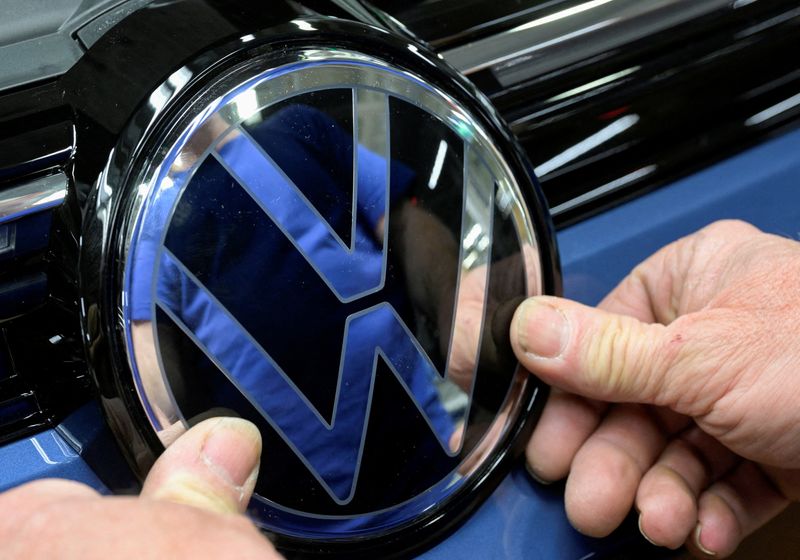By Maria Martinez and John O'Donnell
BERLIN (Reuters) - Having lost cheap energy from Russia and facing uncertainty over its once-lucrative trade ties with China, big German business is now facing a crunch point over a third ingredient in its long-time formula for success - consensual industrial relations.
Together, Germany's industry leaders, trade unions and politicians for decades sought and found agreement over production and labour decisions that in turn provided the underpinning for the country's post-war economic development.
Volkswagen (ETR:VOWG_p)'s taboo-breaking threat to shutter German factories for the first time ever is a direct test of whether that consensus model can survive and still deliver in a global environment some see as existentially challenging.
"De-industrialisation is happening in Germany," Volkswagen works council head Daniela Cavallo said this week, demanding solutions to ensure "there will still be industrial jobs in Germany in the future".
Manufacturing still accounts for 27% of total employment in Germany - down from 32% from 20 years ago, International Labour Organisation figures show, but still a far larger share than in most advanced economies.
About 120,000 of the VW brand's 200,000-strong workforce is in Germany.
The same consensual structures for labour relations that over the years have bought industrial peace and provided job security will now be put to work in negotiations between management and unions due to start next week.
Those talks take place as Volkswagen and other legacy European car giants, including Stellantis (NYSE:STLA) and Renault (EPA:RENA), struggle with high labour and energy costs as well as rising competition from lower-cost Asian rivals shipping more cars to the region.
The fact that worker representatives have half the votes on VW's supervisory board make it hard for the group to force closures. Union leaders want a negotiated solution but management say the scale of the challenges means something has to give.
"If we carry on like this, we won't succeed in the transformation," Chief Financial Officer Arno Antlitz told workers at the carmaker's Wolfsburg headquarters.
"It is our joint responsibility to improve the cost efficiency of the German sites."
IG Metall has said it could consider moving to a four-day week as an alternative to closures - a move put in place in the 1990s for over a decade as part of an earlier cost-cutting drive that included smaller cuts in pay. Volkswagen has remained tight-lipped on whether this could work in today's environment.
TIME IS TIGHT
A separate strand is what role the state should have.
There is a lack of public investment to help develop markets, said Olaf Lies, economy minister of Lower Saxony, where Volkswagen's headquarters and most of the factories affected by the end of the job security programme are based.
The state is also Volkswagen's second-biggest shareholder, and holds two of the 20 seats on its supervisory board.
"This is putting many companies, and therefore Germany as a place to do business, in a very difficult situation," Lies told Reuters.
This has not escaped the notice of Chancellor Olaf Scholz's coalition in Berlin. "Anything to do with industrial production which goes away will not come back," a source inside the coalition told Reuters.
Both Economy Minister Robert Habeck and Finance Minister Christian Lindner acknowledge Germany faces structural problems as a business location, but they differ on what to do - even down to what role electric vehicles play in Germany's future.
While Habeck - from the ecologist Greens - said politicians must offer state guarantees to support the transition to EVs, Lindner - a pro-market Free Democrat - this week described "the fixation" with EVs as a mistake and rejected government measures to help the sector.
Scholz's unpopular coalition, whose component parties have just been battered by the far-right in east German regional votes, faces a general election next year. The Volkswagen move piles pressure on them to finally set clear policy, some argue.
"If such an industrial heavyweight really does have to tighten its austerity programme and close plants, it is perhaps an overdue wake-up call that the economic policy measures taken so far need to be significantly increased," said Carsten Brzeski, global head of macro at ING.
Volkswagen is not alone. Thyssenkrupp (ETR:TKAG), which for decades avoided a major restructuring at its steel division due to stiff labour opposition, has also changed tack.
Its new CEO Miguel Lopez has departed from the strategy of predecessors which kept relations with IG Metall stable to demand a comprehensive revamp he says has been long overdue.
Likewise, chemical giant BASF CEO Markus Kamieth said a series of plants have competitive difficulties. "We must therefore also consider further plant closures."

For now, however, even those who argue that German businesses have been far too late to spot trends in the global economy and react quickly insist it is too early to call the demise of Deutschland AG and its industrial heavyweights.
"We need forward-thinking ideas," said Christiane Benner, chair of IG Metall nationwide. "VW has survived difficult situations before."